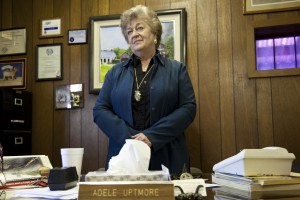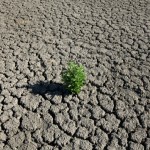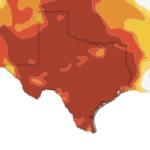A Generation of Texas Farmers and Ranchers, Lost to the Drought
What happens in a country that runs out of farmers? The question may not be as crazy as it sounds.
During the last agricultural census the number of farmers aged 65 or over grew by 22 percent. It’s the fastest growing group of farm operators in the country.
The U.S. Department of Agriculture has been raising the alarm about those shifting demographics. USDA deputy secretary Kathleen Merrigan recently said the trend may even be speeding up nationally, with fewer younger people entering into farming and ranching and much of the older generation nearing retirement.
Here in Texas the drought has only made matters worse.
The record-breaking dry weather forced many who work in agriculture to sell land, equipment, and cattle. It left some of the older among them deciding that they are too late in life to get back into the business.
“It just kind of broke your heart when you saw the older people that had been with you for 25-30 years always bringing their cattle, and it was their last herd. It was the last they sold,” Adele Uptmore told StateImpact Texas.
Uptmore has seen a lot of changes in the decades since she and her husband started running the West Cattle Auction outside of Waco, but she still chokes up thinking about last year, which she calls “the end of an era.” Not only are many of the older Ranchers hanging up their hats, but their children aren’t interested in continuing the family business.
“You know it’s much easier to run a computer than it is to raise and take care of land and cattle,” said Uptmore.
It is a problem that existed long before the drought and extends well beyond ranching.
“[It] has been for several years that young people are not getting into agriculture.” Coleburn Davis, with the Texas Farm Bureau, told StateImpact Texas.
Part of Davis’ job is trying to attract young farmers to the profession. But, he says, last year’s drought made that job all the more difficult.
“It was not a year to get into agriculture,” said Davis.
Davis remains optimistic about programs the Farm Bureau has organized to help spur interest. The Texas and US governments also have grant programs and incentives to attract young farmers. But with so many older farmers hanging up their hats, others are left wondering what Texas agriculture will look like in future years.
Bastrop Rancher Pati Jacobs thinks the generational shift will bring a new focus on smaller organic sustainable farms.
“It’s kind of like we got rid of our manufacturing base and now we’re realizing we need people to go into manufacturing,” said Jacobs in a recent interview.

Jeff Heimsath/StateImpact Texas
Adele Uptmore runs the West Cattle Auction with her husband and son. She says the dorught prompted many older ranchers to retire, and their children are not taking their place.
“For 20 years we told everybody to go work a computer don’t get your hands dirty and now we’re telling people ‘Well, gee, we want grass-fed, we want local foods, and everything’, and we don’t have anyone who can do it anymore,” she said.
But back at the West Auction, Adele Uptmore worries things will go in exactly the opposite direction. She sees family ranches disappearing and large packing operators extending their influence over the industry.
“We’re probably inching towards more of a contract situation, like chickens and hogs and that kind of situation, rather than a hundred head herds in all places,” said Uptmore.
“That may happen,” she added, “I hope it doesn’t.”



